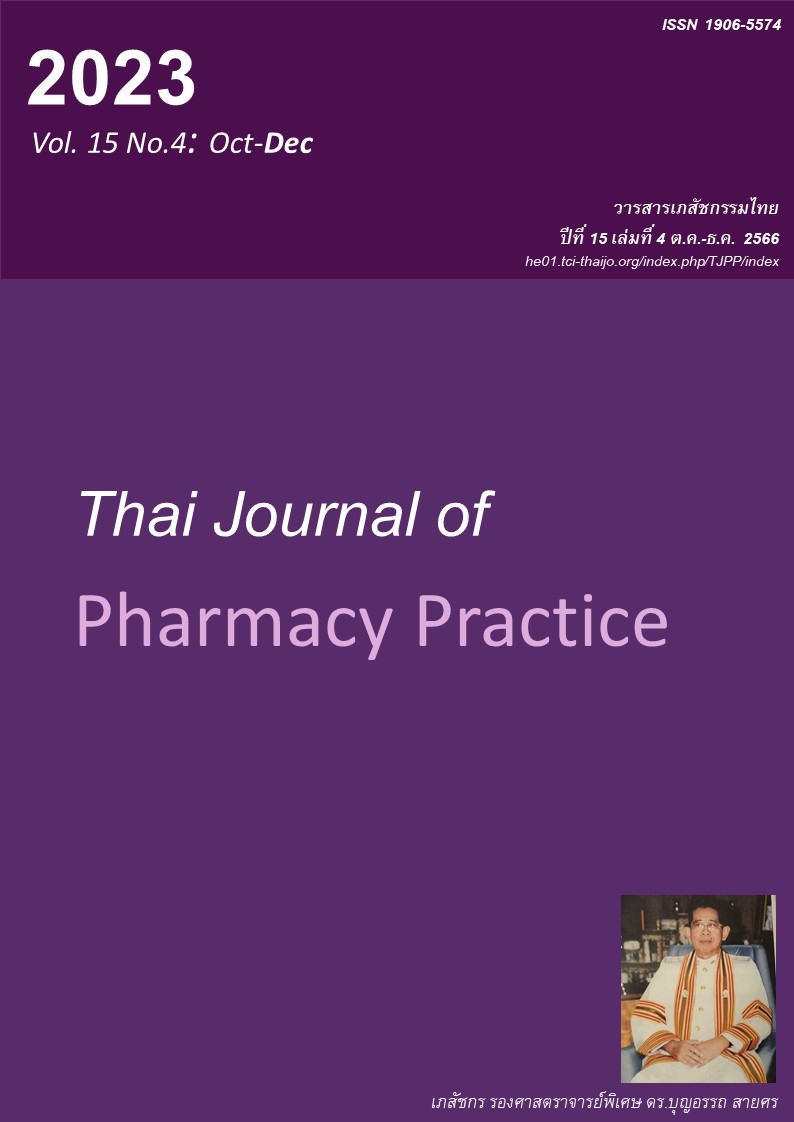การศึกษาจากสถานการณ์จริงถึงประสิทธิผลของการเพิ่มยากลุ่ม SGLT-2 inhibitors ต่อการดำเนินไปของโรคไตเรื้อรังในผู้ป่วยเบาหวานชนิดที่ 2 ที่ใช้ยาลดระดับน้ำตาลในเลือดกลุ่มอื่น
Main Article Content
บทคัดย่อ
วัตถุประสงค์: เพื่อศึกษาผลการชะลอการดำเนินไปของโรคไตเรื้อรังในผู้ป่วยเบาหวานชนิดที่ 2 ที่ได้รับยากลุ่ม SGLT-2 inhibitors (sodium glucose cotransporter-2 inhibitors) ได้แก่ dapagliflozin และ empagliflozin ร่วมกับยาลดระดับน้ำตาลในเลือดกลุ่มอื่นที่ไม่ใช่ SGLT2-inhibitors (non-SGLT-2 inhibitors) วิธีการ: งานวิจัยนี้เป็นการศึกษาเชิงวิเคราะห์แบบย้อนหลังโดยเก็บข้อมูลในผู้ป่วยเบาหวานชนิดที่ 2 ณ สถาบันโรคทรวงอกระหว่างวันที่ 1 ตุลาคม พ.ศ. 2557 ถึง 31 ตุลาคม พ.ศ. 2562 ผู้ป่วยแบ่งออกเป็น 3 กลุ่มคือ 1) กลุ่มที่ได้ยา dapagliflozin 2) กลุ่มที่ได้ยา empagliflozin และ 3) กลุ่มที่ได้รับ non-SGLT-2 inhibitors การศึกษานี้ติดตามผู้ป่วยเป็นระยะเวลา 1 ปีหลังจากเริ่มใช้ยา SGLT-2 inhibitors การดำเนินไปของโรคไตเรื้อรังตัดสินจากค่าประมาณอัตราการกรองผ่านโกลเมอรูลัส (estimated glomerular filtration rate; eGFR) ที่ลดลงจากค่าเริ่มต้นมากกว่าหรือเท่ากับร้อยละ 40 หรือระดับ serum creatinine เพิ่มขึ้น 2 เท่า หรือการเกิดโรคไตเรื้อรังระยะสุดท้าย ผลการวิจัย: ผู้ป่วยเบาหวานชนิดที่ 2 ที่ผ่านเกณฑ์คัดเข้าและคัดออกจากการศึกษา จำนวน 564 ราย แบ่งเป็นสามกลุ่ม กลุ่มละ 188 ราย ผู้ป่วยที่ได้รับยา dapagliflozin และ empagliflozin ที่มีค่า eGFR ลดลงจากค่าเริ่มต้นอย่างน้อยร้อยละ 40 มีจำนวน 9 ราย (ร้อยละ 1.6) และ 3 ราย (ร้อยละ 0.5) ตามลำดับ ขณะที่ผู้ป่วยกลุ่ม non-SGLT-2 inhibitors พบ 14 ราย (ร้อยละ 3.7) ซึ่งแตกต่างกันอย่างมีนัยสำคัญทางสถิติ (P = 0.025) ผู้ป่วยที่ได้รับยากลุ่ม SGLT-2 inhibitors และ non-SGLT-2 inhibitors ที่มีระดับ serum creatinine เพิ่มขึ้น 2 เท่า เท่ากับ 1 ราย (ร้อยละ 0.2) และ 2 ราย (ร้อยละ 0.4) ตามลำดับ แต่ไม่พบความแตกต่างกันอย่างมีนัยสำคัญทางสถิติ (P = 0.366) ทั้งนี้ไม่พบผู้ป่วยโรคไตเรื้อรังระยะสุดท้ายรายใหม่ในผู้ป่วยที่เข้าร่วมการวิจัย สรุป: การได้รับยากลุ่ม SGLT-2 inhibitors สามารถชะลอการดำเนินไปของโรคไตเรื้อรังในผู้ป่วยเบาหวานชนิดที่ 2 ได้ดีกว่า non-SGLT-2 inhibitors เมื่อประเมินจากค่า eGFR ที่ลดลงจากค่าเริ่มต้นอย่างน้อยร้อยละ 40
Article Details

อนุญาตภายใต้เงื่อนไข Creative Commons Attribution-NonCommercial-NoDerivatives 4.0 International License.
ผลการวิจัยและความคิดเห็นที่ปรากฏในบทความถือเป็นความคิดเห็นและอยู่ในความรับผิดชอบของผู้นิพนธ์ มิใช่ความเห็นหรือความรับผิดชอบของกองบรรณาธิการ หรือคณะเภสัชศาสตร์ มหาวิทยาลัยสงขลานครินทร์ ทั้งนี้ไม่รวมความผิดพลาดอันเกิดจากการพิมพ์ บทความที่ได้รับการเผยแพร่โดยวารสารเภสัชกรรมไทยถือเป็นสิทธิ์ของวารสารฯ
เอกสารอ้างอิง
Fowler MJ. Microvascular and macrovascular compli- cations of diabetes. Clin Diabetes. 2008; 26: 77-82.
Afkarian M, Sachs MC, Kestenbaum B, Hirsch IB, Tuttle KR, Himmelfarb J,et al. Kidney disease and increased mortality risk in type 2 diabetes. J Am Soc Nephrol. 2013; 24: 302-8.
Fioretto P, Zambon A, Rossato M, Busetto L, Vettor R. SGLT2 inhibitors and the diabetic kidney. Diabe- tes Care. 2016; 39(Supplement_2): S165-71.
Zelniker TA, Wiviott SD, Raz I, Im K, Goodrich EL, Bonaca MP, Mosenzon O, et al. SGLT2 inhibitors for primary and secondary prevention of cardiovascular and renal outcomes in type 2 diabetes: a systematic review and meta-analysis of cardiovascular outcome trials. Lancet. 2019; 393: 31-9.
Bae JH, Park EG, Kim S, Kim SG, Hahn S, Kim NH. Effects of sodium-glucose cotransporter 2 inhibitors on renal outcomes in patients with type 2 diabetes: a systematic review and meta-analysis of ran- domized controlled trials. Sci Rep. 2019; 9: 13009. doi: 10.1038/s41598-019-49525-y.
Bausell RB, Li YF. Power analysis for experimental research: a practical guide for the biological, medical and social sciences. Cambridge, UK: Cambridge University Press; 2002.
Lin YH, Huang YY, Hsieh SH, Sun JH, Chen ST, Lin CH. Renal and glucose-lowering effects of empag- liflozin and dapagliflozin in different chronic kidney disease stages. Front Endocrinol. 2019; 10: 820.
Fadini GP, Solini A, Manca ML, Penno G, Gatti A, Anichini R, et al. Effectiveness of dapagliflozin versus comparators on renal endpoints in the real world: a multicentre retrospective study. Diabetes Obes Metab. 2019; 21: 252-60.
Mosenzon O, Wiviott SD, Cahn A, Rozenberg A, Yanuv I, Goodrich EL, et al. Effects of dapagliflozin on development and progression of kidney disease in patients with type 2 diabetes: an analysis from the DECLARE–TIMI 58 randomised trial. Lancet Diabetes Endocrinol. 2019; 7: 606-17.
Wanner C, Inzucchi SE, Lachin JM, Fitchett D, von Eynatten M, Mattheus M, et al. Empagliflozin and progression of kidney disease in type 2 diabetes. N Engl J Med. 2016; 375: 323-34.
Heerspink HJ, Stefánsson BV, Correa-Rotter R, Chertow GM, Greene T, Hou FF, et al. Dapagliflozin in patients with chronic kidney disease. N Engl J Med. 2020; 383:1436-46.
Roscioni SS, Heerspink HJ, De Zeeuw D. The effect of RAAS blockade on the progression of diabetic nephropathy. Nat Rev Nephrol. 2014; 10: 77-87.
Vejakama P, Thakkinstian A, Lertrattananon D, Ingsathit A, Ngarmukos C, Attia J. Reno-protective effects of renin–angiotensin system blockade in type 2 diabetic patients: a systematic review and network meta-analysis. Diabetologia. 2012; 55: 566-78.
Wang K, Hu J, Luo T, Wang Y, Yang S, Qing H, et al. Effects of angiotensin-converting enzyme inhibitors and angiotensin II receptor blockers on all-cause mortality and renal outcomes in patients with diabetes and albuminuria: a systematic review and meta-analysis. Kidney Blood Press Res. 2018; 43: 768-79
Nata N, Rangsin R, Supasyndh O, Satirapoj B. Impaired Glomerular Filtration Rate in Type 2 Diabetes Mellitus Subjects: A Nationwide Cross-Sectional Study in Thailand. J Diabetes Res. 2020; 2020: 6353949.


